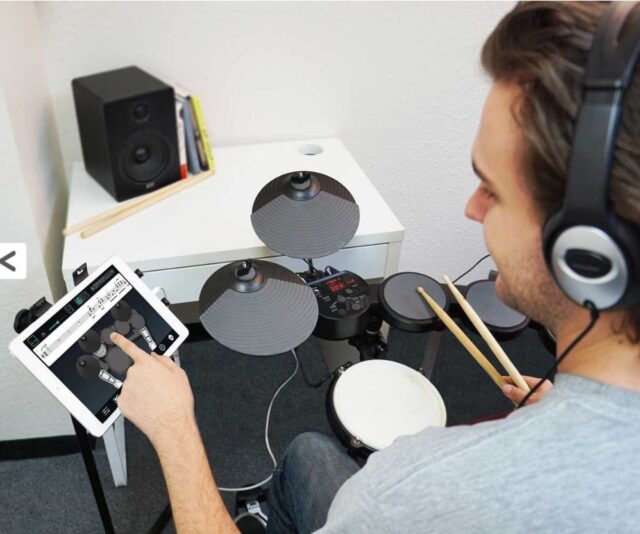
Learning to play drums on your own can be one of the longest journeys in your life. At simplydrum.com, you can find a lot of useful information about the instrument and musical lifestyle. Studying with a teacher, you will undoubtedly gain more experience and spend less time. However, if you decide to practice on your own, read these 6 tips to help you develop in the right direction. The main difference lies in the approach and practice habits. The best method to enhance your drumming is to learn self-control and stick to regular practice.
1. Don’t Start with a Drum Kit

Many beginners think that the pad training is very tedious and time-consuming to spend playing the drum set. This has many more bad consequences than it might seem at first glance. If you do not practice enough technique on the pad, at the installation, your hands will get up in a position that will be convenient for them at the moment of your development. The muscles will begin to get used to such a game, and it will be quite challenging to retrain in the future.
2. Learn Mindfully
Quality is more important than quantity. Of course, the time spent on the drum kit has a positive effect on your progress. But still, when studying at home, focus on quality, not quantity. You will not achieve good technique by simply replaying exercises and drawings thoughtlessly many times.
Follow through to the end. Work on drawings, rudiments, and exercises to perfection. Even if it seems to you that you are already ready to move on, do not give up what you are doing at the moment until the teacher gives you the appropriate task.
Be prepared to waste time. If you study as an adult, your time is divided between work, family, and social life. But if you start making music, you will also have to learn time management. Start with at least 20 minutes of practice but play every day. Over time, this will develop into a habit, and it will become easier for you to find time for more prolonged activities.
3. Right Practice

Set aside time for learning and time for play. It may seem that this is all the same thing because practice makes perfect and no matter how you call it. However, we are sure that these things are different.
One of the biggest mistakes a drummer can make is not devoting time for training. While learning, you work on your stick control, punches, skills, and other playing techniques you would like to know. During the play, you apply the knowledge gained but no longer repeat the same thing over and over again.
Most drummers set aside time to either practice or play and then stop to play tracks from a few of their favorite bands. During training, you can focus on speed and control of legs and sticks without being distracted by other factors.
4. Use a Metronome
It is the simplest drumming tip, but you can’t even describe the importance of the process. Practicing without a metronome can make your drumming worse, as you may learn to play drum fills or fill out unevenly.
Even if you think you have the perfect sense of rhythm, don’t believe yourself. After all, if you want to play in a band, you have a huge responsibility. If you can’t play a simple drum beat or roll with a metronome, how can you lead the band?
There are ways to diversify the use of a metronome and play your favorite tracks. Most professionally recorded songs have a precise metronome, so you can play along with them rather than click on the track. Thus, the lessons will not be boring, and you can listen to your favorite tracks and play along with them. Just make sure you don’t break the first part of the tip or get distracted by the song.
5. Develop Different Skills

Don’t forget that any drummer is a musician first. Try not just to play the instrument, but create music. Everyone who wants to become more than just an amateur in mastering a musical instrument should know these basics.
To fully comprehend playing the drum kit, it is worth at least a little mastery of all the available styles or knows what basis they are built on. Your drum playing will become much more exciting and varied. Practice different grooves and fills, always look for something new but do it consistently. Most styles require specific skills.
6. Choose the Right Equipment
Every drummer dreams of a cool set. But not everyone is ready to put such a whopper at home. Take your time with the purchase and invest your money wisely. Your main investment at this stage is training.
Both beginners and experienced drummers can use a practice pad. The device allows you to study at home without disturbing the peace of mind of your neighbors. Besides, you can always take the pad with you. So this is a perfect chance to have regular training.
If you are ready to face a real drum kit, you should not buy everything at once. Drums differ in their essential characteristics, and there is an excellent variety of them on the market. As for the beginner set, it usually includes 4 or 5 parts. You can choose a snare, a kick drum, and two or three toms. Sometimes, basic kits include a hi-hat.
Hard to Learn, Easy to Play

All the drummers should have some plan for working on their skills. Furthermore, you have to draw knowledge from any available sources. Fortunately, there are a lot of books, articles, YouTube channels, and other materials that can help you to learn and improve. Do not be afraid of other drummers. They can always tell you something interesting or useful.
Over time, every keen drummer begins to understand all the intricacies of the game. So you will quickly learn to recognize your strengths and weaknesses, know what you need to work on.







